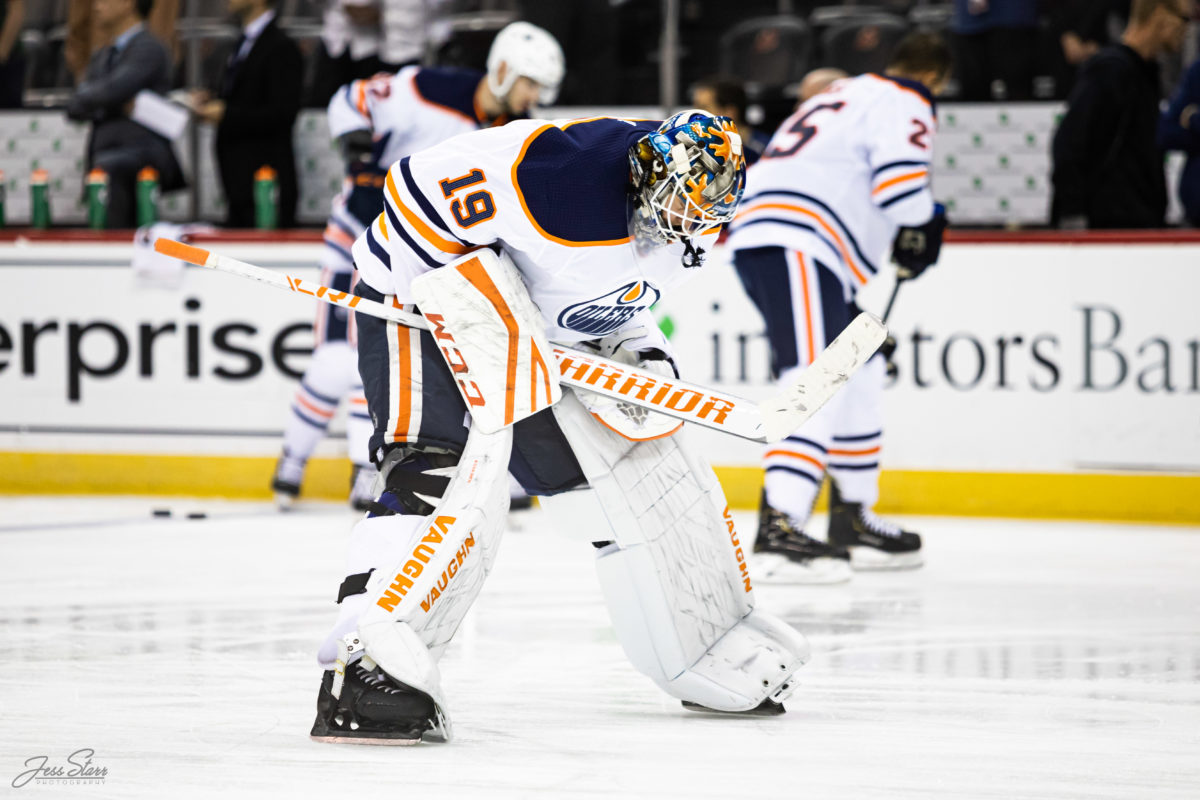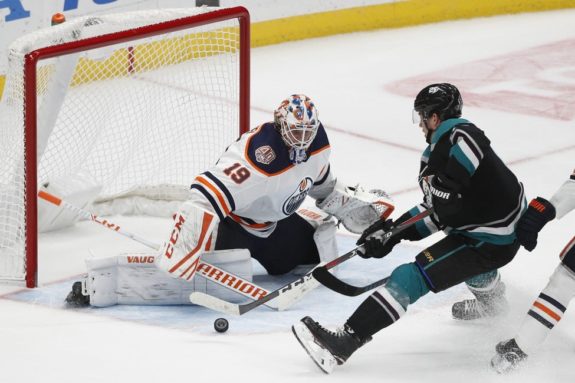After what Mikko Koskinen has done for the Edmonton Oilers this season, it’s unreasonable that fans are still hating on him and blaming him for any misfortunes. He is a 12-2 goalie, tied for second in the league in wins, and doing so in just 14 games.
What makes him so impressive this season is that though he isn’t being paid like a backup goaltender, he was supposed to be in that role. After Mike Smith came back healthy last season, Koskinen assumed the backup role and really settled down while getting fewer starts.
The Good Has Generally Been Overlooked With Koskinen
He was thrown right in the fire in the middle of the third game of the season, and has been carrying the majority of the workload since then. All goaltenders go through droughts or struggles, and we saw that for a five-game stretch after he started 6-1-0 on the season. The goal support was there and has bailed Koskinen out on most nights that he has struggled to stop the puck, but credit has to be given to him for making big and timely saves in games, even the ones where he could’ve played better overall.

If Koskinen was being paid half of his salary, he would be praised with a record of 12-2. But since his contract hasn’t matched his play throughout the three years, that’s all people seem to remember about him. The Oilers’ starter right now is Koskinen, and that doesn’t seem to be changing in the short term with Smith on long-term injured reserve (LTIR) and the trade deadline still a couple months away. Unless they see a long stretch of games where Koskinen looks bad and the team is struggling as a whole and not giving him goal support, there is no need to panic. As time passes, we should get a more clear picture of when Smith is returning, and until then, Stuart Skinner has also stepped up and helped.
Unlike last season where the Oilers didn’t trust Skinner and Koskinen was overplayed and tired out, this season they have the confidence in order to give him some much-needed rest. Koskinen did not play well to begin last season, and he wasn’t able to turn things around until he got his rest after Smith returned. This season, during the midst of his struggles in goal, he was given that rest early and has turned his game around a lot quicker. This was a great move and will do well in sustaining Koskinen’s confidence for the long road ahead.
Against the team that was assumed to be the Oilers’ largest competition this season, Koskinen has been one of the best players in those winning efforts. The Oilers are 2-0 vs. the Vegas Golden Knights this season, while he stopped 72 of 77, and should’ve been the first star of the game with all the high-danger shots the Golden Knights got on him.
Despite only losing twice, it seems as though the consensus is that both of those losses were Koskinen’s fault, but wins are just a result of the offence and outscoring the opponent.
Koskinen Having Better Than Average Season
As far as wins go, I mentioned that Koskinen has the second-most wins in the NHL. Only Jack Campbell of the Toronto Maple Leafs has more (13). Also tied with Koskinen are New York Rangers and Minnesota Wild starters Igor Shesterkin and Cam Talbot. Yes, wins is more of a team stat, but making a timely save or playing better when needed to secure the victory for the team also goes a long way. We saw that exact thing last season with Koskinen not being able to perform up to the task and the Oilers struggled early.
No other goaltender with more than 10 wins has played fewer than 16 games, and Koskinen sits at only 14 games played thus far. He and Ilya Samsonov of the Washington Capitals have the least amount of losses among any goaltender to play seven or more games.
The league-wide save percentage (SV%) is .913, the highest it’s been since the 2015-16 season. Yes, this season is still young and the number of shutouts and low-scoring games should decrease. Despite that, Koskinen has a SV% that is above league average. He sports a .914 SV% and has a better quality start percentage (QS%) than the league average, as well as the highest by a good margin to his career-best. Quality starts is defined as starts with a better SV% than the average SV% for the year. Koskinen has seven quality starts after 13 games started, good for a .538 QS%. His previous high was .515 and this season is his only above the league average of .530.

Koskinen’s goal-against percentage (GA%) and goals saved above average (GSAA) are also better than the league average. The GA% is the goalie’s goals allowed percentage relative to the league goals allowed percentage, while the GSAA calculates the number of goals that a goaltender has saved for his team. Though Koskinen has just a 0.7 GSAA, it’s better than his numbers in two of the three prior seasons in Edmonton where he had a minus-6.2 and minus-6.4 GSAA.
If the wins and more personal stats didn’t convince you, a better comparison will be how Koskinen compares against the other league starters and how his performances really effect the team.
How Does Koskinen Stack Up to the NHL’s Other Starters?
Among the top goaltenders on teams that are at the top of the league, who do you think gets the least amount of credit? Koskinen. If we look at the teams with over 30 points in the standings, there’s Shesterkin, Talbot, Campbell, Frederik Andersen, Sergei Bobrovsky, Samsonov, and Jacob Markstrom. Yes, most of them have been playing elite, but their team’s defence also hasn’t been decimated by injuries this year, losing four rostered players. On top of that, the Oilers weren’t considered a team with high defensive capabilities to start anyway, as they were heavily criticized before the season had even begun.
Related: Oilers Young & Inexperienced Defence Will be Tested
How about we take a look at starters that have gotten much more credit than they deserve. Goaltenders like Darcy Kuemper, Robin Lehner, Thatcher Demko, and Jordan Binnington all have a worse SV% than Koskinen and all have a negative GSAA. They have all had good starts and game-saving moments, but due to their past success in net, everyone is less critical of them overall and just assumes they will return to form eventually this season and Koskinen will just get worse.
So, if that wasn’t enough, compare Koskinen to other goaltenders a little more in his range — goalies that have had the opportunity but haven’t taken advantage and had poor seasons thus far. To name a few: Vitek Vanecek, Spencer Knight, Calvin Petersen, and Thomas Greiss. Again, all of these goaltenders have a lower SV% and GSAA than Koskinen and have been given their shots in net like he has, they have just been outplayed and put up less than ideal numbers.
Though Koskinen is only above average in most categories, he is seen by many as one of the worst goalies in the league, despite his stats and performance this season. Comparing him to expectations and a general consensus on him, his play has been leaps and bounds better and he is an NHL starter on some teams, and a good one this season for the Oilers.